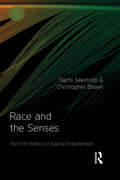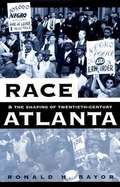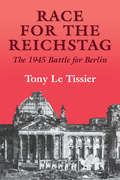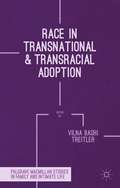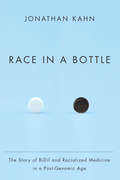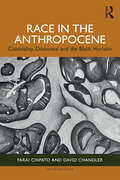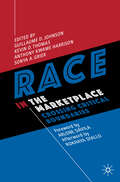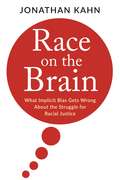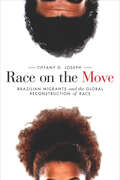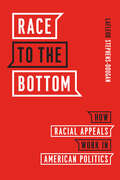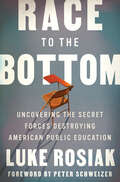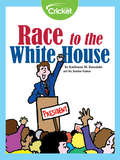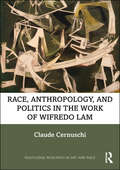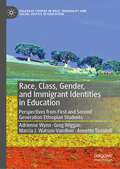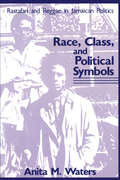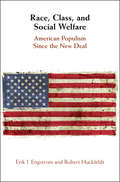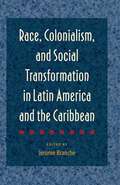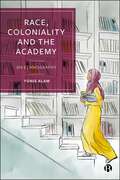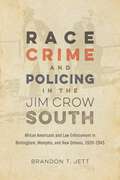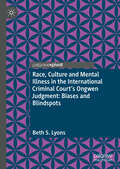- Table View
- List View
Race and the Senses: The Felt Politics of Racial Embodiment (Sensory Studies)
by Christopher Brown Sachi SekimotoIn Race and the Senses, Sachi Sekimoto and Christopher Brown explore the sensorial and phenomenological materiality of race as it is felt and sensed by the racialized subjects. Situating the lived body as an active, affective, and sensing participant in racialized realities, they argue that race is not simply marked on our bodies, but rather felt and registered through our senses. They illuminate the sensorial landscape of racialized world by combining the scholarship in sensory studies, phenomenology, and intercultural communication. Each chapter elaborates on the felt bodily sensations of race, racism, and racialization that illuminate how somatic labor plays a significant role in the construction of racialized relations of sensing. Their thought-provoking theorizing about the relationship between race and the senses include race as a sensory assemblage, the phenomenology of the racialized face and tongue, kinesthetic feelings of blackness, as well as the possibility of cross-racial empathy. Race is not merely socially constructed, but multisensorially assembled, engaged, and experienced. Grounded in the authors’ experiences, one as a Japanese woman living in the USA, and the other as an African American man from Chicago, Race and the Senses is a book about how we feel the racialized world into being.
Race and the Shaping of Twentieth-Century Atlanta
by Ronald H. BayorAtlanta is often cited as a prime example of a progressive New South metropolis in which blacks and whites have forged "a city too busy to hate." But Ronald Bayor argues that the city continues to bear the indelible mark of racial bias. Offering the first comprehensive history of Atlanta race relations, he discusses the impact of race on the physical and institutional development of the city from the end of the Civil War through the mayorship of Andrew Young in the 1980s. Bayor shows the extent of inequality, investigates the gap between rhetoric and reality, and presents a fresh analysis of the legacy of segregation and race relations for the American urban environment. Bayor explores frequently ignored public policy issues through the lens of race--including hospital care, highway placement and development, police and fire services, schools, and park use, as well as housing patterns and employment. He finds that racial concerns profoundly shaped Atlanta, as they did other American cities. Drawing on oral interviews and written records, Bayor traces how Atlanta's black leaders and their community have responded to the impact of race on local urban development. By bringing long-term urban development into a discussion of race, Bayor provides an element missing in usual analyses of cities and race relations.
Race and the Totalitarian Century
by Vaughn RasberryVaughn Rasberry turns to black culture and politics for an alternative history of the totalitarian century. He shows how black writers reimagined the standard anti-fascist, anti-communist narrative through the lens of racial injustice, with the U.S. as a tyrannical force in the Third World but also an agent of Asian and African independence.
Race for the Reichstag: The 1945 Battle for Berlin (Soviet (Russian) Military Experience #No. 4)
by Tony, Le Tissier MBEThe soldiers of the Red Army identified the Reichstag as the victor's prize to be taken in Berlin. This account of the battle lays the many myths created by Soviet propaganda after the event to rest and details what exactly happened as the Red Army and the Allies raced to be the first at the Reichstag.
Race in Transnational and Transracial Adoption
by Vilna Bashi TreitlerWhen parents form families by reaching across social barriers (the color line, or the boundaries between 'First World' and 'Third World' nations) to adopt children, where and how does race enter the adoption process? How do agencies, parents, and the adopted children themselves deal with issues of difference in adoption? This volume engages writers from both sides of the Atlantic to take a close look at race in transnational and transracial adoption. The contributors tackle questions of how adoption agencies engage race online; how parents understand race as a factor in raising their adopted children; how culture camps engage with parents and children about racial issues; and how social policy shapes the racial aspects of adoption, for better or worse.
Race in a Bottle: The Story of BiDil and Racialized Medicine in a Post-Genomic Age
by Jonathan KahnAt a ceremony announcing the completion of the first draft of the human genome in 2000, President Bill Clinton declared, "I believe one of the great truths to emerge from this triumphant expedition inside the human genome is that in genetic terms, all human beings, regardless of race, are more than 99.9 percent the same." Yet despite this declaration of unity, biomedical research has focused increasingly on mapping that.1 percent of difference, particularly as it relates to race.This trend is exemplified by the drug BiDil. Approved by the FDA in 2005 as the first drug with a race-specific indication on its label, BiDil was originally touted as a pathbreaking therapy to treat heart failure in black patients and help underserved populations. Upon closer examination, however, Jonathan Kahn reveals a far more complex story. At the most basic level, BiDil became racial through legal maneuvering and commercial pressure as much as through medical understandings of how the drug worked. Using BiDil as a central case study, Kahn broadly examines the legal and commercial imperatives driving the expanding role of race in biomedicine, even as scientific advances in genomics could render the issue irrelevant. He surveys the distinct politics informing the use of race in medicine and the very real health disparities caused by racism and social injustice that are now being cast as a mere function of genetic difference. Calling for a more reasoned approach to using race in biomedical research and practice, Kahn asks readers to recognize that, just as genetics is a complex field requiring sensitivity and expertise, so too is race, particularly in the field of biomedicine.
Race in the Anthropocene: Coloniality, Disavowal and the Black Horizon (ISSN)
by David Chandler Farai ChipatoRace in the Anthropocene provides a radical new perspective on the importance of race and coloniality in the Anthropocene. It forwards the Black Horizon as a critical lens which places at its heart the importance of ontological concerns fundamental to problematising the violences and exclusions of the antiblack world.At present, multiple new approaches are emerging through the shared problem field of Anthropocene thought and policy, offering to save not just the world, but the practice of governance, the business of Big Data, the progress of development, and the dream of peace. It is against this backdrop that Race in the Anthropocene unsettles not just the already shaky foundations of modernity but also the affirmative visions of its critics, by directing our gaze to how race and coloniality are baked into the grounding concepts of international thought.This book is essential reading for students of International Relations, particularly those interested in international politics, security, and development. It is also of relevance for those interested in contemporary social, political, and environmental debates and policy practices.
Race in the Marketplace: Crossing Critical Boundaries
by Guillaume D. Johnson Kevin D. Thomas Anthony Kwame Harrison Sonya A. GrierThis volume offers a critical, cross-disciplinary, and international overview of emerging scholarship addressing the dynamic relationship between race and markets. Chapters are engaging and accessible, with timely and thought-provoking insights that different audiences can engage with and learn from. Each chapter provides a unique journey into a specific marketplace setting and its sociopolitical particularities including, among others, corner stores in the United States, whitening cream in Nigeria and India, video blogs in Great Britain, and hospitals in France. By providing a cohesive collection of cutting-edge work, Race in the Marketplace contributes to the creation of a robust stream of research that directly informs critical scholarship, business practices, activism, and public policy in promoting racial equity.
Race on the Brain: What Implicit Bias Gets Wrong About the Struggle for Racial Justice
by Jonathan KahnOf the many obstacles to racial justice in America, none has received more recent attention than the one that lurks in our subconscious. As social movements and policing scandals have shown how far from being “postracial” we are, the concept of implicit bias has taken center stage in the national conversation about race. Millions of Americans have taken online tests purporting to show the deep, invisible roots of their own prejudice. A recent Oxford study that claims to have found a drug that reduces implicit bias is only the starkest example of a pervasive trend. But what do we risk when we seek the simplicity of a technological diagnosis—and solution—for racism? What do we miss when we locate racism in our biology and our brains rather than in our history and our social practices?In Race on the Brain, Jonathan Kahn argues that implicit bias has grown into a master narrative of race relations—one with profound, if unintended, negative consequences for law, science, and society. He emphasizes its limitations, arguing that while useful as a tool to understand particular types of behavior, it is only one among several tools available to policy makers. An uncritical embrace of implicit bias, to the exclusion of power relations and structural racism, undermines wider civic responsibility for addressing the problem by turning it over to experts. Technological interventions, including many tests for implicit bias, are premised on a color-blind ideal and run the risk of erasing history, denying present reality, and obscuring accountability. Kahn recognizes the significance of implicit social cognition but cautions against seeing it as a panacea for addressing America’s longstanding racial problems. A bracing corrective to what has become a common-sense understanding of the power of prejudice, Race on the Brain challenges us all to engage more thoughtfully and more democratically in the difficult task of promoting racial justice.
Race on the Move: Brazilian Migrants and the Global Reconstruction of Race
by Tiffany D. JosephRace on the Move takes readers on a journey from Brazil to the United States and back again to consider how migration between the two countries is changing Brazilians' understanding of race relations. Brazil once earned a global reputation as a racial paradise, and the United States is infamous for its overt social exclusion of nonwhites. Yet, given the growing Latino and multiracial populations in the United States, the use of quotas to address racial inequality in Brazil, and the flows of people between each country, contemporary race relations in each place are starting to resemble each other. Tiffany Joseph interviewed residents of Governador Valadares, Brazil's largest immigrant-sending city to the U. S. , to ask how their immigrant experiences have transformed local racial understandings. Joseph identifies and examines a phenomenon-the transnational racial optic-through which migrants develop and ascribe social meaning to race in one country, incorporating conceptions of race from another. Analyzing the bi-directional exchange of racial ideals through the experiences of migrants, Race on the Move offers an innovative framework for understanding how race can be remade in immigrant-sending communities.
Race over Empire
by Eric T. LoveGenerations of historians have maintained that in the last decade of the nineteenth century white-supremacist racial ideologies such as Anglo-Saxonism, social Darwinism, benevolent assimilation, and the concept of the "white man's burden" drove American imperialist ventures in the nonwhite world. In Race over Empire, Eric T. L. Love contests this view and argues that racism had nearly the opposite effect. From President Grant's attempt to acquire the Dominican Republic in 1870 to the annexations of Hawaii and the Philippines in 1898, Love demonstrates that the imperialists' relationship with the racist ideologies of the era was antagonistic, not harmonious. In a period marked by Jim Crow, lynching, Chinese exclusion, and immigration restriction, Love argues, no pragmatic politician wanted to place nonwhites at the center of an already controversial project by invoking the concept of the "white man's burden." Furthermore, convictions that defined "whiteness" raised great obstacles to imperialist ambitions, particularly when expansionists entered the tropical zone. In lands thought to be too hot for "white blood," white Americans could never be the main beneficiaries of empire.What emerges from Love's analysis is a critical reinterpretation of the complex interactions between politics, race, labor, immigration, and foreign relations at the dawn of the American century.
Race the Wind (Willow King #2)
by Chris PlattThanks to the faith and hard work of Katie Durham, Willow King no longer has badly twisted legs. After painstaking training, the colt has gained the strength to compete in major races--and Katie is determined to prove he's a champion. Unfortunately, her new ambition presents her with the most nerve-racking challenge of her life: earning a jockey's license and riding Willow King in the Kentucky Derby. This inspiring story, a sequel to the author's award-winning first novel, is based on her real experiences as a jockey, groom, and assistant horse trainer.
Race to Kill
by Rachel Kall"Rachel Kall writes gritty, fast-paced, realistic romantic suspense that carries a punch to the gut and a twist to the heart. Don't miss a word!" --Roxanne St. Claire, New York Times bestselling authorA Love and Scandal Novel (#1)When fiercely independent Vivian Reese is thrust onto the national stage during a heated presidential campaign, she doesn't expect to become a media darling. She also doesn't expect to start to fall for her sexy new bodyguard, Marcus Locke. But when threats start surfacing against the sitting President's campaign and all evidence points to Vivian, she doesn't know who to trust.Delta Force Operator turned FBI agent Marcus Locke is supposed to be investigating campaign finance crimes. He's not supposed to be checking out the sexy, eloquent campaign spokeswoman Vivian Reese, who's one of his prime suspects! But when they are caught in the middle of a presidential race that is quickly turning deadly, he is forced to put both his heart and his job in the line of fire.Tempers flare and passions ignite as the campaign gets dangerous, but when bullets start to fly will either of them survive?
Race to the Bottom: How Racial Appeals Work in American Politics (Chicago Studies in American Politics)
by LaFleur Stephens-DouganAfrican American voters are a key demographic to the modern Democratic base, and conventional wisdom has it that there is political cost to racialized “dog whistles,” especially for Democratic candidates. However, politicians from both parties and from all racial backgrounds continually appeal to negative racial attitudes for political gain. Challenging what we think we know about race and politics, LaFleur Stephens-Dougan argues that candidates across the racial and political spectrum engage in “racial distancing,” or using negative racial appeals to communicate to racially moderate and conservative whites—the overwhelming majority of whites—that they will not disrupt the racial status quo. Race to the Bottom closely examines empirical data on racialized partisan stereotypes to show that engaging in racial distancing through political platforms that do not address the needs of nonwhite communities and charged rhetoric that targets African Americans, immigrants, and others can be politically advantageous. Racialized communication persists as a well-worn campaign strategy because it has real electoral value for both white and black politicians seeking to broaden their coalitions. Stephens-Dougan reveals that claims of racial progress have been overstated as our politicians are incentivized to employ racial prejudices at the expense of the most marginalized in our society.
Race to the Bottom: Uncovering the Secret Forces Destroying American Public Education
by Luke RosiakEveryone wants: High schoolers to graduate well-prepared for jobs. Improved STEM literacy. Greater achievement for inner-city children. Happiness for all children. So why are liberals spending billions of dollars working against those goals?In Race to the Bottom, Luke Rosiak uncovers the shocking reason why American education is failing: Powerful special interest groups are using our kids as guinea pigs in vast ideological experiments. These groups’ initiatives aren’t focused on making children smarter—but on implementing a radical agenda, no matter the effect on academic standards. Nonprofits pump billions into initiatives meant to redress racial inequities. Rather than fixing the problem, districts with a big gap between white and black test scores hire consultants who claim the tests are meaningless because they are “racist.” These consultants’ judgments allow school districts to ignore their own failures—ultimately hurting minority students and perpetuating racism.That is just one example. Drawing on his years in investigative journalism, Rosiak did a deep dive into school files, financial records, and parents’ stories. What he found is that nonprofit influence has crept into the educational bureaucracy all over America. Corrupt school boards and quack diversity consultants abound. Teachers drawing government pay claim it’s unsafe to return to in-person school, but “double dip” teaching in-person private classes. And amid all this focus on money and equity, academic standards are crumbling, which hurts American kids in ways we’ll be suffering for decades.Race to the Bottom is the first comprehensive exposé of the way radical ideology and self-serving administrators are destroying academic quality in America’s K-12 schools. Rigorous and deeply-researched, this is essential reading for anyone who cares about the future of our kids.
Race to the White House
by Kathiann M. KowalskiThere's a job available to all natural-born American citizens aged 35 and older: the President! From campaigning to conventions, voting and the Electoral College, it's a long way to the Oval Office! U.S. presidents have a lot of work ahead of them, such as preserving the Constitution and making sure the laws of the land are obeyed.
Race, Anthropology, and Politics in the Work of Wifredo Lam (Routledge Research in Art and Race)
by Claude CernuschiThis book reinterprets Wifredo Lam’s work with particular attention to its political implications, focusing on how these implications emerge from the artist’s critical engagement with 20th-century anthropology. Field work conducted in Cuba, including the witnessing of actual Afro-Cuban religious ritual ceremonies and information collected from informants, enhances the interpretive background against which we can construe the meanings of Lam's art. In the process, Claude Cernuschi argues that Lam hoped to fashion a new hybrid style to foster pride and dignity in the Afro-Cuban community, as well as counteract the acute racism of Cuban culture.
Race, Class, Gender, and Immigrant Identities in Education: Perspectives from First and Second Generation Ethiopian Students (Palgrave Studies in Race, Inequality and Social Justice in Education)
by Greg Wiggan Marcia J. Watson-Vandiver Adrienne Wynn Annette TeasdellThis volume addresses the underlying intersections of race, class, and gender on immigrant girls’ experiences living in the US. It examines the impact of acculturation and assimilation on Ethiopian girls’ academic achievement, self-identity, and perception of beauty. The authors employ Critical Race Theory, Critical Race Feminism, and Afrocentricity to situate the study and unpack the narratives shared by these newcomers as they navigate social contexts rife with racism, xenophobia, and other forms of oppression. Lastly, the authors examine the implications of Ethiopian immigrant identities and experiences within multicultural education, policy development, and society.
Race, Class, and Affirmative Action
by Sigal AlonNo issue in American higher education is more contentious than that of race-based affirmative action. In light of the ongoing debate around the topic and recent Supreme Court rulings, affirmative action policy may be facing further changes. As an alternative to race-based affirmative action, some analysts suggest affirmative action policies based on class. In Race, Class, and Affirmative Action, sociologist Sigal Alon studies the race-based affirmative action policies in the United States. and the class-based affirmative action policies in Israel. Alon evaluates how these different policies foster campus diversity and socioeconomic mobility by comparing the Israeli policy with a simulated model of race-based affirmative action and the U.S. policy with a simulated model of class-based affirmative action. Alon finds that affirmative action at elite institutions in both countries is a key vehicle of mobility for disenfranchised students, whether they are racial and ethnic minorities or socioeconomically disadvantaged. Affirmative action improves their academic success and graduation rates and leads to better labor market outcomes. The beneficiaries of affirmative action in both countries thrive at elite colleges and in selective fields of study. As Alon demonstrates, they would not be better off attending less selective colleges instead. Alon finds that Israel’s class-based affirmative action programs have provided much-needed entry slots at the elite universities to students from the geographic periphery, from high-poverty high schools, and from poor families. However, this approach has not generated as much ethnic diversity as a race-based policy would. By contrast, affirmative action policies in the United States have fostered racial and ethnic diversity at a level that cannot be matched with class-based policies. Yet, class-based policies would do a better job at boosting the socioeconomic diversity at these bastions of privilege. The findings from both countries suggest that neither race-based nor class-based models by themselves can generate broad diversity. According to Alon, the best route for promoting both racial and socioeconomic diversity is to embed the consideration of race within class-based affirmative action. Such a hybrid model would maximize the mobility benefits for both socioeconomically disadvantaged and minority students. Race, Class, and Affirmative Action moves past political talking points to offer an innovative, evidence-based perspective on the merits and feasibility of different designs of affirmative action.
Race, Class, and Political Symbols: Rastafari and Reggae in Jamaican Politics
by Anita M. WatersDr. Waters is one of a new breed of analysts for whom the interpenetration of politics, culture, and national development is key to a larger integration of social research. Race, Class, and Political Symbols is a remarkably cogent examination of the uses of Rastafarian symbols and reggae music in Jamaican electoral campaigns. The author describes and analyzes the way Jamaican politicians effectively employ improbable strategies for electoral success. She includes interviews with reggae musicians, Rastafarian leaders, government and party officials, and campaign managers. Jamaican democracy and politics are fused to its culture; hence campaign advertisements, reggae songs, party pamphlets, and other documents are part of the larger picture of Caribbean life and letters. This volume centers and comes to rest on the adoption of Rastafarian symbols in the context of Jamaica's democratic institutions, which are characterized by vigorous campaigning, electoral fraud, and gang violence. In recent national elections, such violence claimed the lives of hundreds of people. Significant issues are dealt with in this cultural setting: race differentials among Whites, Browns, and Blacks; the rise of anti-Cubanism; the Rastafarians' response to the use of their symbols; and the current status of Rastafarian ideological legitimacy.
Race, Class, and Social Welfare: American Populism Since the New Deal
by Erik J. Engstrom Robert HuckfeldtWhat makes it so difficult to enact and sustain comprehensive social welfare policy that would aid the disadvantaged in the United States? Addressing the relationship between populism and social welfare, this book argues that two competing camps of populists divide American politics. Regressive populists motivated by racial resentment frequently clash with progressive populists, who embrace an expansion of social welfare benefits for the less affluent, regardless of race or ethnicity. Engstrom and Huckfeldt uncover the political forces driving this divided populism, its roots in the aftermath of the civil rights revolution of the mid-twentieth century, and its implications for modern American politics and social welfare policy. Relying on a detailed analysis of party coalitions in the US Congress and the electorate since the New Deal, the authors focus on the intersection between race, class, and oligarchy.
Race, Colonialism, and Social Transformation in Latin America and the Caribbean
by Jerome BrancheThis collection of essays offers a comprehensive overview of colonial legacies of racial and social inequality in Latin America and the Caribbean. Rich in theoretical framework and close textual analysis, these essays offer new paradigms and approaches to both reading and resolving the opposing forces of race, class, and the power of states. The contributors are drawn from a variety of fields, including literary criticism, anthropology, politics, and sociology. The contributors to this book abandon the traditional approaches that study racialized oppression in Latin America only from the standpoint of its impact on either Indians or people of African descent. Instead they examine colonialism's domination and legacy in terms of both the political power it wielded and the symbolic instruments of that oppression. The volume's scope extends from the Southern Cone to the Andean region, Mexico, and the Hispanophone and Francophone Caribbean. It contests many of the traditional givens about Latin America, including governance and the nation state, the effects of globalization, the legacy of the region's criollo philosophers and men of letters, and postulations of harmonious race relations. As dictatorships give way to democracies in a variety of unprecedented ways, this book offers a necessary and needed examination of the social transformations in the region.
Race, Coloniality and the Academy: An Ethnography
by Yunis AlamHow do academic spaces perpetuate racial and religious inequalities, and what can be done to challenge them? This thought-provoking book examines the intersections of ethnicity, faith and class with a focus on British South Asian Muslim identity. Drawing on ethnographic insights and theoretical frameworks such as postcoloniality, orientalism and hybridity, the author unpacks representations of race, religion and Islamophobia in both academic and public discourse. By connecting historical legacies of imperialism with contemporary inequalities, the book offers both critical analysis and practical suggestions for action. Written in an accessible yet provocative style, this book is set to spark vital conversations and inspire meaningful interventions in higher education and beyond.
Race, Crime, and Policing in the Jim Crow South: African Americans and Law Enforcement in Birmingham, Memphis, and New Orleans, 1920–1945 (Making the Modern South)
by Brandon T. JettThroughout the Jim Crow era, southern police departments played a vital role in the maintenance of white supremacy. Police targeted African Americans through an array of actions, including violent interactions, unjust arrests, and the enforcement of segregation laws and customs. Scholars have devoted much attention to law enforcement’s use of aggression and brutality as a means of maintaining African American subordination. While these interpretations are vital to the broader understanding of police and minority relations, Black citizens have often come off as powerless in their encounters with law enforcement. Brandon T. Jett’s Race, Crime, and Policing in the Jim Crow South, by contrast, reveals previously unrecognized efforts by African Americans to use, manage, and exploit policing. In the process, Jett exposes a much more complex relationship, suggesting that while violence or the threat of violence shaped police and minority relations, it did not define all interactions. Black residents of southern cities repeatedly complained about violent policing strategies and law enforcement’s seeming lack of interest in crimes committed against African Americans. These criticisms notwithstanding, Blacks also voiced a desire for the police to become more involved in their communities to reduce the seemingly intractable problem of crime, much of which resulted from racial discrimination and other structural factors related to Jim Crow. Although the actions of the police were problematic, African Americans nonetheless believed that law enforcement could play a role in reducing crime in their communities. During the first half of the twentieth century, Black citizens repeatedly demanded better policing and engaged in behaviors designed to extract services from law enforcement officers in Black neighborhoods as part of a broader strategy to make their communities safer. By examining the myriad ways in which African Americans influenced the police to serve the interests of the Black community, Jett adds a new layer to our understanding of race relations in the urban South in the Jim Crow era and contributes to current debates around the relationship between the police and minorities in the United States.
Race, Culture and Mental Illness in the International Criminal Court’s Ongwen Judgment: Biases and Blindspots
by Beth S. LyonsDominic Ongwen was abducted in 1987 when he was 8 or 9 years old by the Lord’s Resistance Army (‘LRA’) in Northern Uganda and trafficked as a child soldier; he made multiple unsuccessful attempts to escape, and finally succeeded in late 2014. He turned himself into the International Criminal Court in 2015 and was prosecuted. Mr. Ongwen’s defence was that he was not responsible for the crimes of the LRA, based on his mental illnesses and duress, stemming from his abduction and subsequent coercion and indoctrination under Joseph Kony within the LRA. In February 2021, the ICC’s Trial Chamber IX convicted Dominic Ongwen of 61 charges and two modes of liability and he was sentenced to 25 years incarceration. This work critiques the judicial racial and cultural biases and blindspots in the Ongwen Judgment rendered by the ICC, as related to the affirmative defences of mental disease or defect and duress and to sentencing, from the perspective of the author who served as a defence counsel in the case.
